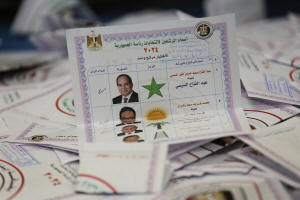|
The
election took place as Egypt struggles with a slow-burning
economic crisis and tries to manage the risk of spillover from
the war in Gaza, which borders Egypt's Sinai Peninsula.
Some voters said that the eruption of conflict in Gaza had
encouraged them to vote for Sisi, who has long presented himself
as a bulwark of stability in a volatile region - an argument
that has also proved effective with Gulf and Western allies
providing financial support to his government.
Voting in Egypt was held over three days on Dec. 10-12, with the
state and tightly controlled domestic media pushing hard to
boost turnout above the 41% recorded the last presidential
election in 2018.
The election featured three other candidates, none of them high
profile. The most prominent potential challenger halted his run
in October, saying officials and thugs had targeted his
supporters - accusations dismissed by the National Election
Authority.
Sisi, a former general, has overseen a sweeping crackdown on
dissent across the political spectrum since leading the 2013
overthrow of Egypt's first democratically elected leader,
Mohamed Mursi of the Muslim Brotherhood.
He was elected to the presidency in 2014, and re-elected in
2018, both times with 97% of the vote. The constitution was
amended in 2019, extending the presidential term to six years
from four, and allowing Sisi to stand for a third term.
Authorities have sought to address criticism of Egypt's human
rights record with steps including by opening a national
dialogue and releasing some prominent prisoners, steps that
critics have dismissed as largely cosmetic.
Many Egyptians expressed indifference about the election, saying
the result was a foregone conclusion.
Reuters reporters who covered the vote in Cairo, Giza, Suez and
the Sinai Peninsula witnessed people being bussed in to some
polling stations and lingering outside them waving national
flags or banners as patriotic music played. Other polling
stations appeared quiet. A Reuters reporter saw bags of flour,
rice and other basic commodities being handed out to people who
voted in Giza.
Egypt's state media body has said the vote was a step towards
political pluralism and authorities have denied violations of
electoral rules.
(Reporting by Farah Saafan; Writing by Aidan Lewis; Editing by
Nick Macfie)
[© 2023 Thomson Reuters. All
rights reserved.]
Copyright 2022 Reuters. All rights reserved. This material may
not be published, broadcast, rewritten or redistributed.
Thompson Reuters is solely responsible for this content.

|
|




